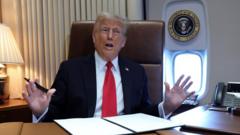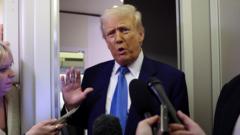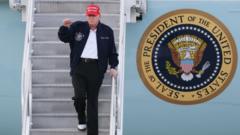Trump's announcement of new tariffs reflects an aggressive stance on trade, invoking reciprocal measures against countries imposing their own tariffs on US goods while igniting criticism from Canadian leadership over potential economic repercussions.
Trump Plans Major Tariffs on Steel and Aluminium Imports

Trump Plans Major Tariffs on Steel and Aluminium Imports
President Donald Trump announces a 25% tariff on steel and aluminium imports, impacting the US's closest trading partners.
In a recent statement from Air Force One, Donald Trump declared his intention to impose a 25% import tax on all steel and aluminium entering the United States, a move that primarily affects Canada, the leading supplier of aluminium and a major recipient of US steel. This decision marks a significant escalation in his trade policy, which has previously seen tariffs targeting Canada and Mexico during his first term, but those were lifted following negotiations. This time, Trump indicated that the new tariffs would apply to "everybody," asserting that reciprocal tariffs would follow later in the week as a response to countries that tax US imports.
Trump made these announcements en route to the Super Bowl in New Orleans, stating, "If they charge us, we charge them." The planned tariffs represent a continuation of Trump's strategy to bolster the US economy and protect manufacturing jobs, which he believes is central to his economic vision.
Criticism of Trump’s approach came from Ontario's Premier, Doug Ford, who accused the president of endangering the economic stability of Canada with his unpredictable trade policies. The impact of these tariffs is particularly worrisome for the Canadian steel industry, concentrated in Ontario where many workers depend on this sector for their livelihoods.
Earlier in the month, Trump had hinted at imposing similar duties on goods from Canada and Mexico, but those plans were postponed for 30 days following discussions with leaders from both countries. Furthermore, Trump has previously imposed a 10% tariff on Chinese imports, leading to retaliatory measures from Beijing against US goods.
In his travel comments, Trump suggested that forthcoming tariffs would "take effect almost immediately" and touted the idea of "reciprocal tariffs" as beneficial for all nations involved. He emphasized his belief that these tariffs would ultimately support US growth and job creation. However, there remains speculation about how these measures might impact American consumers, who may face higher prices as a result of the trade restrictions.
Aside from trade discussions, Trump took the opportunity to declare February 9 "Gulf of America" day, a controversial move that garnered scrutiny related to international naming conventions. On a lighter note, he fielded questions about potential future meetings with Russian President Vladimir Putin but refrained from revealing details on their communications.
As the tariffs are set to roll out, many eyes will be on both the immediate response from affected countries and the longer-term implications these actions will have for international trade relations and the global economy.
Trump made these announcements en route to the Super Bowl in New Orleans, stating, "If they charge us, we charge them." The planned tariffs represent a continuation of Trump's strategy to bolster the US economy and protect manufacturing jobs, which he believes is central to his economic vision.
Criticism of Trump’s approach came from Ontario's Premier, Doug Ford, who accused the president of endangering the economic stability of Canada with his unpredictable trade policies. The impact of these tariffs is particularly worrisome for the Canadian steel industry, concentrated in Ontario where many workers depend on this sector for their livelihoods.
Earlier in the month, Trump had hinted at imposing similar duties on goods from Canada and Mexico, but those plans were postponed for 30 days following discussions with leaders from both countries. Furthermore, Trump has previously imposed a 10% tariff on Chinese imports, leading to retaliatory measures from Beijing against US goods.
In his travel comments, Trump suggested that forthcoming tariffs would "take effect almost immediately" and touted the idea of "reciprocal tariffs" as beneficial for all nations involved. He emphasized his belief that these tariffs would ultimately support US growth and job creation. However, there remains speculation about how these measures might impact American consumers, who may face higher prices as a result of the trade restrictions.
Aside from trade discussions, Trump took the opportunity to declare February 9 "Gulf of America" day, a controversial move that garnered scrutiny related to international naming conventions. On a lighter note, he fielded questions about potential future meetings with Russian President Vladimir Putin but refrained from revealing details on their communications.
As the tariffs are set to roll out, many eyes will be on both the immediate response from affected countries and the longer-term implications these actions will have for international trade relations and the global economy.























